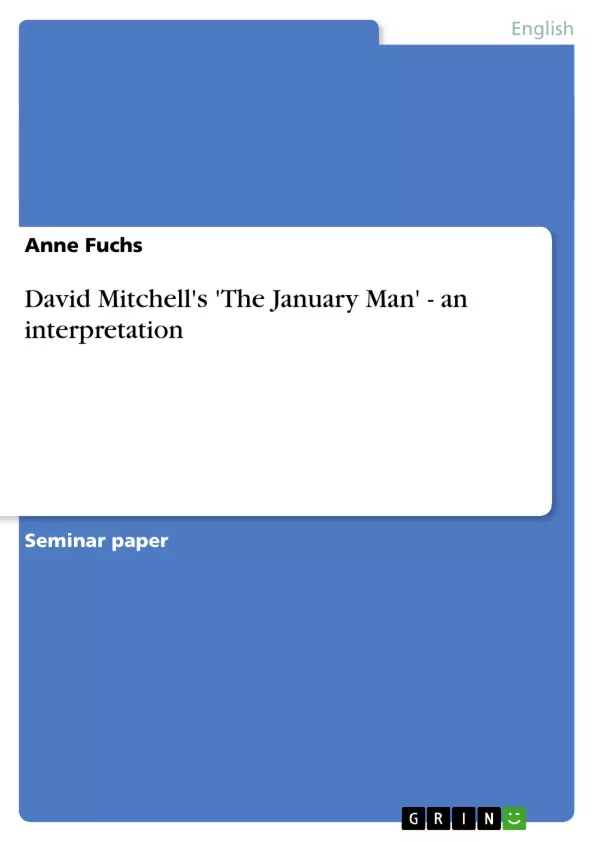Why did I choose Mitchell′s story? Superficially because it′s very easy to get into the story and entertaining to go on, not only because of the colloquial style but also because of the exciting plot, which casts a spell over the reader – but in the final analysis, it was because there hides a complex story under the trivial appearing surface in David Mitchell′s ′The January Man′.
In this assignment I release the view on the hidden characteristics and special qualities of this story by first interpreting it within the individual paragraphs, then by examining the aspects relevant for the whole story to categorize David Mitchell′s story on the basis of my insights and in relation to Modernist, Postmodernist and Contemporary Short Stories.
Inhaltsverzeichnis (Table of Contents)
- Introduction
- Main Part
- Interpretation
- Is 'The January Man' a typical Contemporary British Short Story?
- Conclusion
- Bibliography
Zielsetzung und Themenschwerpunkte (Objectives and Key Themes)
This analysis aims to dissect the complexities of David Mitchell's short story "The January Man" by offering an interpretation of its individual sections and exploring its relation to broader literary trends. The analysis delves into the story's hidden layers, unveiling its unique narrative structure and its thematic connections to Modernist, Postmodernist, and Contemporary Short Stories.
- The interplay between surface narrative and hidden meaning in short stories.
- The evolution of the short story genre, particularly in the context of contemporary British writing.
- The use of character development and narrative structure to create suspense and intrigue.
- The portrayal of childhood innocence and its confrontation with the complexities of adult life.
- The role of setting and time period in shaping the story's themes and atmosphere.
Zusammenfassung der Kapitel (Chapter Summaries)
The analysis starts by delving into the first paragraph of the story, highlighting the significance of the opening sentence and the introduction of the protagonist, Jason. The paragraph establishes the setting and Jason's character as a reflective and intelligent young boy. The second paragraph introduces the element of mystery, with a phone call that hints at the possibility of Jason's father having an affair. The analysis then moves on to explore the subsequent paragraphs, focusing on the development of suspense and the gradual unveiling of the hidden layers of the narrative.
Schlüsselwörter (Keywords)
Key terms that capture the essence of this analysis include "The January Man," David Mitchell, Contemporary British Short Story, Interpretation, Narrative Structure, Modernism, Postmodernism, Suspense, Childhood Innocence, and Hidden Meaning.
Frequently Asked Questions
What is the central theme of David Mitchell's 'The January Man'?
The story explores the confrontation between childhood innocence and the complexities of the adult world, specifically through the eyes of a young boy named Jason who discovers hidden family secrets.
Is 'The January Man' considered a typical contemporary British short story?
The analysis examines this question by looking at its narrative structure and colloquial style, categorizing it in relation to Modernist, Postmodernist, and Contemporary literary trends.
Who is the protagonist of the story?
The protagonist is Jason, a reflective and intelligent young boy whose perspective shapes the reader's understanding of the unfolding mystery.
How does David Mitchell create suspense in this short story?
Suspense is created through the gradual unveiling of hidden layers, starting with a trivial surface and introducing mysterious elements like an ambiguous phone call suggesting an affair.
What literary movements are discussed in the interpretation?
The interpretation relates the story to Modernism, Postmodernism, and Contemporary short story writing to identify its specific qualities and historical placement.
- Quote paper
- Anne Fuchs (Author), 2004, David Mitchell's 'The January Man' - an interpretation, Munich, GRIN Verlag, https://www.grin.com/document/35714



